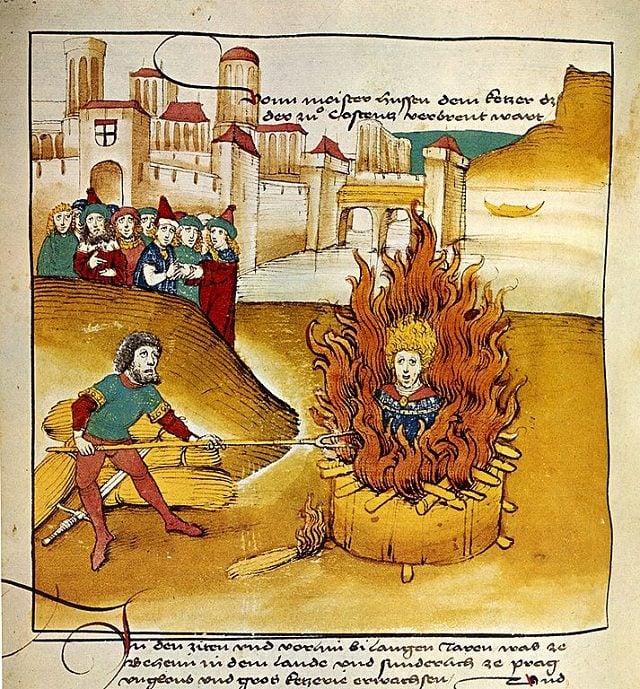
[from Catholic philosopher Edward Feser’s blog, but not with him. Three people (different colors below) kept asking me questions, and so I kept answering, as apologists are wont to do. Again, I’m still a green rookie as a total anti-, but here goes: ]
*****
I just don’t get where Armstrong is coming from, regarding his position on capital punishment. He says he agrees it would be troublesome to “cross the line” and say death penalty is always and in any situation immoral and unacceptable. But then how doesn’t he also accept that it would be troublesome to think the Church could do such a troublesome thing? I understand these are not exactly the same thing, but they are very similar nonetheless, and if we are troubled by the suggestion that capital punishment is an intrinsic evil, we should probably be troubled by the idea that the Church could declare such a view to be true.
Feser and Bessette have argued that we can still have the death penalty in practice even today. But that’s not their main point at all; it’s actually just their additional, more ambitious view. Their main point is actually showing how the death penalty cannot be an intrinsic evil that is always unacceptable. Whether or not we agree with the DP in practice for prudential or some humanitarian reasons, it is a far more ambitious claim to say the death penalty can never be justified in any situation. 50 years ago there wouldn’t even have been such a debate in the church, the idea is nonsense. I find it sad how so many catholics are taking up this radical anti-death penalty view, and seem unable to understand the gist of the debate.
I agree (and so does Dr. Fastiggi) that it is not intrinsically immoral. We also both don’t believe it’ll be promulgated as such. If it is (as so many seem to be afraid of), I’ll cross that bridge when I get to it.
So, if you hold (and if Fastiggi holds) that the death penalty is not intrinsically wrong, then is the disagreement merely one concerning the prudence of its application today? If so, then I’m not sure what the fuss has been about.
Largely, yes. It is believed that the death penalty is contrary to the gospel and Christian charity and witness to a pro-life worldview, and a maximum opportunity for the criminal to repent, to execute them, when society has other ways to protect itself from them without doing that.
If the death penalty is not intrinsically evil and thus at least in in principle justified for certain crimes as a just penalty, then how can it be contrary to the gospel and charity? Are justice and charity at odds with each other? Is the gospel opposed to justice?
Because it’s contrary to charity to kill someone if we don’t have to for the sake of society. Justice is served by their incarceration, and mercy and charity are served by sparing their life and giving them time to ponder and repent.
You say that you, and Dr Fastiggi (contra to his public remarks), do not believe that capital punishment is malum in se.
That’s correct. To my knowledge, Bob has not said otherwise.
However, you then say that the death penalty is “contrary to the Gospel”. If the death penalty is “contrary to the Gospel”, then how is it not fundamentally contradictory to the divine and natural law?
I thought I gave a pretty decent reply to that two comments of mine above.
If it is fundamentally contrary to the Gospel, why do great doctors of the Church and the Council Fathers of Trent (in the catechism produced by them) teach the opposite?
Because in those days it wasn’t as possible to protect society from evil men short of the death penalty, as has been made clear in the rationales provided by Pope St. John Paul II for nearly total abolition of the death penalty.
I simply do not see how one can maintain that the death penalty is not malum in se and yet it be “contrary to the Gospel”. It appears to be a contradiction in terms.
Not helping the poor, for example, is contrary to the gospel and commands of Jesus. That’s not intrinsically evil, I don’t think, as a sin of omission, but it’s not the “full gospel” either, is it? Polygamy is now considered contrary to the gospel (hence we all have one wife only). But in the past, God permitted it (e.g., the concubinage in the OT, including Abraham, David, and Solomon). If He permitted it, it can’t be intrinsically evil. Incest was permitted in the early days, for the sake of populating the earth. Now it isn’t.
In response to it being contrary to a “witness to a pro-life worldview”, are you saying that St Thomas Aquinas and St Alphonsus Liguori did not hold to a pro-life worldview?
No; different times, as I explained above, and as Pope St. John Paul II explains. I love St. Thomas. I put together an abridged Summa and used to have a web page devoted to him.
Further, are you saying that modern opponents of the death penalty, which tend to be pro-abortion once you get outside of the Catholic blogosphere, really witness to a pro-life worldview?
They don’t, because they are radically inconsistent, and espouse intrinsic evil. You can’t nail me here, either.
These same allies which you will find yourself with also tend to oppose life imprisonment without the possibility of parole, especially if it includes long episodes in solitary confinement (to protect prison staff). [They think] that amounts to torture.
That gets into true reform and rehabilitation and repentance, which is another complex issue. I’m all for it. It usually has to be Christian-based, to be effective.
***
(originally posted on Facebook on 12-6-17)
Photo credit: Burning of Jan Hus at the stake (1485), by Diebold Schilling the Older, Spiezer Chronik [public domain / Wikimedia Commons]
***













